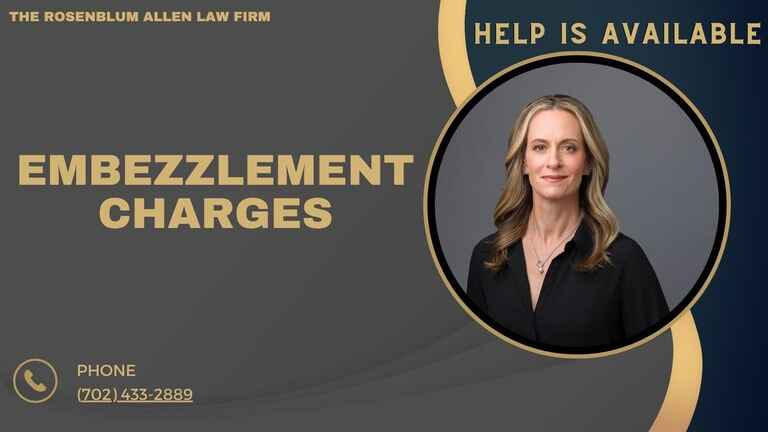What is Embezzlement?
Embezzlement is a serious financial crime. It involves taking money or property that has been entrusted to you, with the intent to deprive the rightful owner of it. This act is not just a simple theft; it comes from a position of trust.

Definition of Embezzlement
At its core, embezzlement occurs when someone who is in a position of authority over someone else’s money misuses that trust. For example, an employee may divert company funds for personal use.
Differences Between Embezzlement and Theft
While embezzlement and theft may seem similar, they have distinct legal definitions:
- Embezzlement: Involves betrayal of trust. The individual had legal access to the funds or property.
- Theft: Involves taking someone else’s property without permission. There is no prior trust established.
Common Examples of Embezzlement in Various Industries
Embezzlement can happen in any sector. Here are some common scenarios:
- Corporate settings: Employees funneling money from company accounts into personal accounts.
- Nonprofits: Fundraisers misusing donations intended for charitable causes.
- Financial institutions: Bank employees manipulating client accounts for personal gain.
Legal Consequences of Embezzlement Charges
Embezzlement charges can lead to serious legal repercussions. Understanding these consequences is essential if you or someone you know is facing such charges.
Overview of Potential Charges
The charges for embezzlement can vary widely based on the amount of money involved and the circumstances surrounding the crime.
Felony vs. Misdemeanor Embezzlement
Embezzlement can be classified as either a felony or a misdemeanor:
- Felony: Generally applies to larger amounts, often over $1,000. This can lead to significant prison time and hefty fines.
- Misdemeanor: Typically involves smaller amounts. While still serious, the consequences are usually less severe.
Potential Prison Sentences and Fines
The penalties can be daunting. Here’s a general breakdown:
| Amount Embezzled | Charge Type | Possible Sentence | Possible Fine |
|---|---|---|---|
| Under $1,000 | Misdemeanor | Up to 1 year in jail | Up to $1,000 |
| $1,000 – $50,000 | Felony | 1 to 5 years in prison | $5,000 – $25,000 |
| Over $50,000 | Felony | 5 years to life in prison | $25,000 or more |
The severity of the consequences emphasizes the importance of understanding embezzlement charges thoroughly.

Elements of Embezzlement
To convict someone of embezzlement, prosecutors must prove specific elements. Each element plays a crucial role in establishing guilt.
Key Components Required to Prove Embezzlement
Understanding these components can help clarify the legal definition of embezzlement:
- Intent to Defraud: The accused must have intended to steal or misuse the funds.
- Misappropriation of Funds: There must be a clear act of taking or using funds for personal gain.
- Trust Relationship with the Victim: A fiduciary relationship exists, meaning the accused had legal access to the funds based on trust.
These elements combine to form the foundation of embezzlement charges, shaping the legal landscape around this crime.
Common Defenses Against Embezzlement Charges
Facing embezzlement charges can be daunting. However, there are potential legal defenses that can help protect your rights. Understanding these defenses is essential if you find yourself in this situation.
Potential Legal Defenses
Here are some common defenses that individuals might use when charged with embezzlement:
Lack of Intent: To prove embezzlement, prosecutors must show that the accused intended to defraud. If the accused did not plan to steal or misuse the funds, this can serve as a strong defense.
Authorization of Funds: Sometimes, individuals might argue they had permission to use the funds. If they can demonstrate that they were authorized to spend the money in question, it can help their case.
Errors in Accounting or Record-Keeping: Mistakes can happen. If the accused can show that any alleged misappropriation was simply an error in accounting or record-keeping, this may mitigate the charges.
Importance of Building a Defense
Constructing a solid defense is essential. A skilled attorney can help navigate the challenges of the case and find the best strategy. Understanding your rights and exploring all available options is key to achieving a favorable outcome.
How Embezzlement Cases Are Investigated
The investigation of embezzlement cases involves various steps. Knowing how these cases are examined can provide clarity on what to expect if you are implicated.
Typical Investigative Procedures
Here’s an overview of how embezzlement investigations typically unfold:
Initial Complaint: Investigations often begin with a complaint from an employer or organization that suspects wrongdoing.
Gathering Evidence: Authorities may collect documents, financial records, and emails related to the case. They may also interview witnesses and the accused.
Forensic Accounting: Specialists may analyze financial data to identify discrepancies and track misappropriated funds. This process helps to establish a clearer picture of what occurred.
Role of Forensic Accounting
Forensic accountants play a vital role in embezzlement cases. They help uncover hidden assets and trace the flow of money. Their knowledge can significantly impact the investigation’s outcome.
Collaboration with Law Enforcement
Embezzlement investigations often involve collaboration between forensic accountants and law enforcement agencies. This teamwork can enhance the effectiveness of the investigation and ensure all necessary evidence is gathered.

Impact of Embezzlement Charges on Individuals
Facing embezzlement charges can have far-reaching effects. It’s important to understand how these charges can impact various aspects of life.
Personal Consequences of Embezzlement Charges
Here are some common repercussions that individuals may experience:
Employment Implications: Many employers conduct background checks. A criminal charge can lead to job loss or difficulty finding new employment.
Reputation Damage: Embezzlement charges can tarnish personal and professional reputations. The stigma associated with such accusations can affect relationships and social standing.
Financial Repercussions: Legal fees, restitution, and potential fines can lead to significant financial strain. Individuals may find themselves struggling to manage their finances during and after the legal process.
Navigating the Consequences
It can feel overwhelming, but understanding these impacts can help individuals take proactive steps. Seeking support from legal professionals and financial advisors is vital in managing these challenges.
Steps to Take if Facing Embezzlement Charges
If you are facing embezzlement charges, knowing what to do next is essential. Taking the right steps can help protect your rights and interests.
Immediate Actions to Consider
Here are some crucial steps to take if you find yourself in this situation:
Contacting a Legal Professional: It’s vital to seek legal advice as soon as possible. An experienced attorney can help you understand your rights and the best course of action.
Gathering Documentation and Evidence: Collect any relevant documents, emails, or records that can support your case. Having organized evidence can be beneficial for your defense.
Avoiding Further Communication with Authorities: Be cautious about speaking with investigators or law enforcement without legal representation. Anything you say can be used against you, so it’s best to have an attorney present.
Importance of a Calm Approach
Facing charges can be stressful. Staying calm and organized can help you make informed decisions. Rely on your attorney for guidance and support during this challenging time.
Penalties for Embezzlement
Understanding the potential penalties for embezzlement is vital for anyone facing such charges. The consequences can vary widely based on several factors.
Overview of Possible Penalties
Here’s a breakdown of common penalties individuals may face if convicted of embezzlement:
Fines: Convictions often come with hefty fines. These can range from a few thousand dollars to several million, depending on the amount embezzled.
Restitution: Courts may require offenders to pay back the stolen funds. This is in addition to any fines imposed and can be a significant financial burden.
Probation: Some offenders may receive probation instead of jail time. This means they must follow certain conditions, such as regular check-ins with a probation officer and avoiding further legal trouble.
Incarceration: Serious cases of embezzlement can lead to prison time. Sentences can vary, but they often range from a few years to several decades.
Criminal Record: A conviction for embezzlement results in a criminal record. This can affect future job opportunities and travel, among other aspects of life.
Factors Influencing Penalties
Several factors can influence the severity of penalties in embezzlement cases:
Amount Involved: The total sum of money embezzled significantly impacts the penalty. Larger amounts typically lead to harsher consequences.
Prior Criminal History: Individuals with a history of similar offenses may face stricter penalties. Courts often take past behavior into account when determining sentences.
Intent and Circumstances: If the accused acted with clear intent to defraud or if there were aggravating circumstances, penalties may be more severe.

Embezzlement and Employment
Embezzlement charges can have serious implications for employment. Understanding these effects can help individuals navigate their professional lives post-accusation.
Effects on Current Employment
Here’s how embezzlement charges can impact current jobs:
Job Loss: Many employers terminate employees facing embezzlement charges. The stigma associated with such accusations can make it difficult to remain employed.
Suspension or Leave: Some employers may choose to suspend the employee while the investigation is ongoing. This can affect income and job security.
Internal Investigations: Employers often conduct internal investigations in response to embezzlement accusations. This can lead to further scrutiny and potential job termination.
Challenges in Future Employment
Securing a new job after embezzlement charges can be challenging:
Background Checks: Many companies perform background checks. A record of embezzlement can disqualify individuals from job opportunities.
Reputation Concerns: Potential employers may hesitate to hire someone with a criminal charge. Overcoming this reputation can take time and effort.
Strategies for Managing Employment Challenges
Despite the challenges, individuals can take steps to manage their employment situations:
Networking: Building connections can lead to job opportunities. Personal referrals may help bypass background check concerns.
Explaining the Situation: Being honest about the situation during interviews can build trust. Presenting a clear narrative about the events can help mitigate concerns.
Seeking Professional Help: Consulting career coaches or legal advisors can provide guidance on navigating employment after embezzlement charges.
Moving Forward After Embezzlement Charges
Recovering from embezzlement charges can be a long and challenging process. However, with the right strategies, individuals can rebuild their lives.
Steps to Rebuild Life After Charges
Here are some essential steps to consider for moving forward:
Focus on Legal Resolution: Prioritize resolving legal matters first. Engaging a competent attorney can help ensure the best possible outcome.
Rebuild Reputation: Actively work on rebuilding personal and professional reputations. Volunteering, networking, and being involved in the community can help.
Seek Support: Surround yourself with supportive friends and family. Emotional support is essential during difficult times.
Importance of Personal Growth
Focusing on personal growth can be beneficial after facing such challenges:
Education and Skill Development: Consider pursuing further education or skills training. This can enhance job prospects and rebuild confidence.
Positive Mindset: Maintain a positive outlook. Resilience is vital when facing adversity.
Engagement in Community: Getting involved in local initiatives can foster connections and help rebuild trust with others.

Breaking It Down for You
Facing embezzlement charges is undoubtedly a difficult experience. Understanding the potential defenses, penalties, and consequences is essential. Taking proactive steps can help individuals navigate the complexities of this situation. Seeking legal guidance and focusing on personal growth can pave the way for a more positive future.

Frequently Asked Questions
What is embezzlement?
Embezzlement is the act of wrongfully taking or misappropriating funds or property entrusted to an individual’s care. This crime typically involves someone in a position of trust, such as an employee or a fiduciary, who unlawfully converts someone else’s property for personal use.
How can I defend myself against embezzlement charges?
There are several potential defenses against embezzlement charges, including proving a lack of intent to steal, demonstrating that the funds were used with permission, or showing that there was no misappropriation of property. Consulting a qualified attorney can help identify the most effective defense strategy for your specific situation.
What are the differences between embezzlement and theft?
While both embezzlement and theft involve the unlawful taking of property, embezzlement specifically refers to the misappropriation of funds or property that one has been entrusted to manage. Theft, on the other hand, involves taking someone else’s property without permission, regardless of a prior relationship of trust.
Can embezzlement charges be expunged from my record?
In some cases, individuals may be able to expunge their embezzlement charges from their criminal record after completing their sentence or probation. The eligibility for expungement often depends on the jurisdiction and the specific circumstances of the case. Consulting a legal professional can provide guidance on this process.
How does embezzlement impact my credit score?
Having a criminal record for embezzlement may not directly affect your credit score, but the financial consequences of a conviction, such as fines or restitution, can impact your ability to pay bills on time. Additionally, difficulties in finding employment may affect your financial stability, indirectly influencing your credit score.
What should I do if I am falsely accused of embezzlement?
If you are falsely accused of embezzlement, it’s important to remain calm and seek legal counsel immediately. Document any evidence that supports your innocence, such as emails, receipts, or witness statements. An attorney can help you navigate the situation and protect your rights throughout the legal process.
How long does an embezzlement case take to resolve?
The duration of an embezzlement case can vary significantly based on several factors, including the complexity of the case, the legal strategies employed, and the court’s schedule. Cases can take anywhere from a few months to several years to resolve.
Can embezzlement charges lead to federal prosecution?
Yes, embezzlement can lead to federal prosecution if it involves federal funds or institutions, such as banks or government entities. Federal embezzlement cases typically carry harsher penalties and may involve more complex legal proceedings compared to state-level cases.
What role does restitution play in embezzlement cases?
Restitution is the court-ordered repayment of stolen funds to the victim. In embezzlement cases, the court often requires the offender to make restitution in addition to serving any criminal penalties. This requirement aims to compensate the victim for their financial loss.
What happens during an embezzlement trial?
During an embezzlement trial, both the prosecution and defense present evidence and witness testimonies to support their case. The prosecution must prove beyond a reasonable doubt that the accused committed embezzlement, while the defense seeks to challenge the evidence and present alternative explanations. The trial culminates in a verdict, determining guilt or innocence.

Glossary
Embezzlement: The act of wrongfully taking or misappropriating funds or property entrusted to an individual’s care, typically involving a breach of trust.
Theft: The unlawful taking of someone else’s property with the intent to permanently deprive the owner of it, distinct from embezzlement, which involves property entrusted to the accused.
Defendant: An individual accused of a crime in a court of law. In embezzlement cases, the defendant is the person charged with the offense.
Prosecution: The legal party responsible for presenting the case against the defendant in a criminal trial, aiming to prove the accused’s guilt beyond a reasonable doubt.
Restitution: Court-ordered compensation that the offender must pay to the victim for the financial loss incurred due to the crime, often part of the penalties in embezzlement cases.
Fiduciary: A person or organization that has the legal duty to act in the best interests of another party, often involving a relationship of trust, such as a financial advisor or trustee.
Intent: The mental state or purpose behind an individual’s actions, particularly regarding whether a person intended to commit a crime, such as embezzlement.
Burden of Proof: The obligation of the prosecution to present sufficient evidence to prove the defendant’s guilt in a criminal trial, requiring a higher standard than in civil cases.
Verdict: The decision reached by a jury or judge in a trial regarding the defendant’s guilt or innocence.
Sentencing: The process by which a judge determines the appropriate punishment for a convicted individual following a guilty verdict in a criminal case.
Expungement: The legal process of sealing or removing a criminal record from public view, allowing individuals to clear their record under certain conditions.
Charges: Formal accusations made against an individual by the government, outlining specific criminal conduct that the accused is alleged to have committed.
Trial: The legal proceeding in which evidence is presented, and arguments are made by both sides to determine the outcome of a case in a court of law.
Legal Counsel: A lawyer or attorney who provides advice and representation to individuals involved in legal matters, including criminal charges like embezzlement.
Breach of Trust: The violation of a duty to act in the best interests of another party, which is a key element in cases of embezzlement, as it involves misusing someone else’s property.
Fraud: The wrongful or criminal deception intended to result in financial or personal gain, often related to embezzlement when deceit is used to acquire funds.
Charges Dismissed: A legal term indicating that the court has decided not to pursue the case against the defendant, often due to lack of evidence or other factors.
Felony: A serious crime, typically punishable by imprisonment for more than one year or by death, which embezzlement can be classified as, depending on the amount involved.

Additional Resources for You
In moments of legal uncertainty, especially when facing charges related to theft or financial crimes, having a trusted source of information can be invaluable. Our lead attorney, Molly Rosenblum, Esq., has meticulously developed a range of resources to provide clarity and guidance. Each resource is tailored to address specific charges, ensuring you have access to detailed, relevant information. Here’s an overview of the comprehensive resources created by Molly Rosenblum, Esq.:
Theft Crime Defense Lawyer: A detailed guide for legal defense strategies in cases of theft, ensuring you understand your rights and options. Explore the guide.
White Collar Crime: Navigate the complex landscape of white-collar crime charges and understand the potential legal ramifications. Learn more.
Racketeering Charges: Unravel the intricacies of racketeering charges and the associated legal processes. Get informed.
Fraud Charges: Understand the serious nature of fraud charges and explore potential defense strategies. Read more.
Identity Theft Charges: Learn about the legal consequences of identity theft charges and how to effectively address them. Discover your options.
Larceny Charges: Get detailed information about larceny charges, potential penalties, and defense strategies. Explore your defenses.
Credit Card Fraud Charges: Understand the serious implications of credit card fraud charges and how to approach them legally. Learn the details.
Burglary Charges: Familiarize yourself with the legal nuances of burglary charges and what they mean for your case. Read about burglary law.
Robbery Charges: Gain insights into the specific legal considerations and potential consequences of robbery charges. Discover more.
Grand Theft Charges: Understand the complexities and legal definitions surrounding grand theft charges. Learn about grand theft law.
Molly Rosenblum, Esq. is dedicated to providing comprehensive and accessible resources to assist you in times of legal need. Each resource is meticulously crafted to ensure you have the necessary knowledge to navigate the complexities of theft and financial crime charges.

Offsite Resources for You
American Bar Association: This is one of the most respected legal organizations in the United States. They offer a variety of resources for both lawyers and the public, including information on legal topics and finding legal help.
Legal Information Institute – Cornell Law School: This institute provides free access to important legal resources, including the U.S. constitution, supreme court decisions, and other federal and state laws.
The National Association of Criminal Defense Lawyers (NACDL): This organization offers resources for criminal defense attorneys and those interested in the criminal justice system.
Justia: Justia provides free case law, codes, regulations, and legal information for lawyers and the general public at both the state and federal levels.
FindLaw: This is a free legal information website, featuring a comprehensive lawyer directory, legal news, and a large database of free legal articles.
Nevada Revised Statutes: This is the official website for Nevada state laws, which can be helpful for understanding specific legal issues and penalties in Nevada.
Nevada State Bar: The official website of the Nevada State Bar offers resources for finding a lawyer, as well as information about the state’s legal system.

A Special Message from Our Lead Attorney

Molly Rosenblum
Dear Reader,
Thank you so much for taking the time to review our embezzlement defense resources. I am Molly Rosenblum, Esq, and I understand that navigating through this complex legal landscape can be challenging and often overwhelming.
It’s crucial to remember that you don’t have to face these challenges on your own. Our experienced team is here to provide the legal support and guidance you need. We are committed to protecting your rights and advocating for your best interests.
Please reach out to us to schedule a free consultation. We can discuss your case in detail and explore the best strategies for your defense. You can reach us at (702) 433-2889.
We look forward to the opportunity to assist you during this difficult time.
Best Regards,
Molly Rosenblum, Esq.




